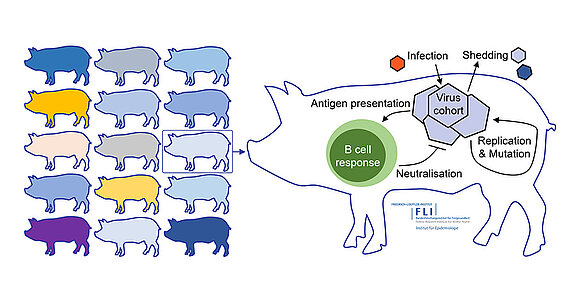
The SARS-CoV-2 pandemic demonstrated how newly emerging zoonotic pathogens with transboundary-spread can have massive socioeconomic impact. The global, unprecedented dissemination of serious livestock diseases such as African Swine Fever (ASF), Lumpy Skin Disease (LSD) or Avian Influenza (AI) is similarly dramatic.
Host immunity is a fundamental determinant that controls whether or not diseases can emerge and spread in general, by influencing how pathogens persist, transmit, evolve or recede towards elimination. Harnessing host immunity through vaccination is often one the only means by which it is possible to limit ongoing disease transmission, thus highlighting immunity as a key to understanding principles of disease emergence and spread.
In the Immuno-Epidemiology-Lab (IEL), we investigate how the individual immune state influences population-level disease epidemiology and pathogen co-evolution.
By assuming a host perspective, we use models, experimental methods and field studies to understand how immune responses plausibly lead to the emergence of observed disease dynamics. Our work provides fundamental insights on host-pathogen co-evolution, and on the link between individual immune states and population health overall.
Our mission is to develop innovative immunological and epidemiological techniques that help nurture disease resilient life in a changing climate.

